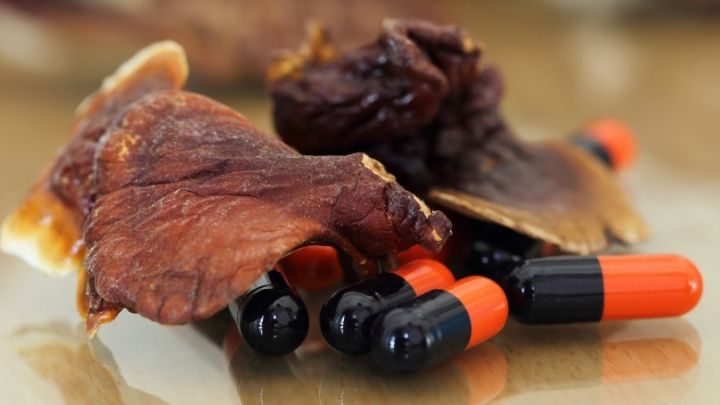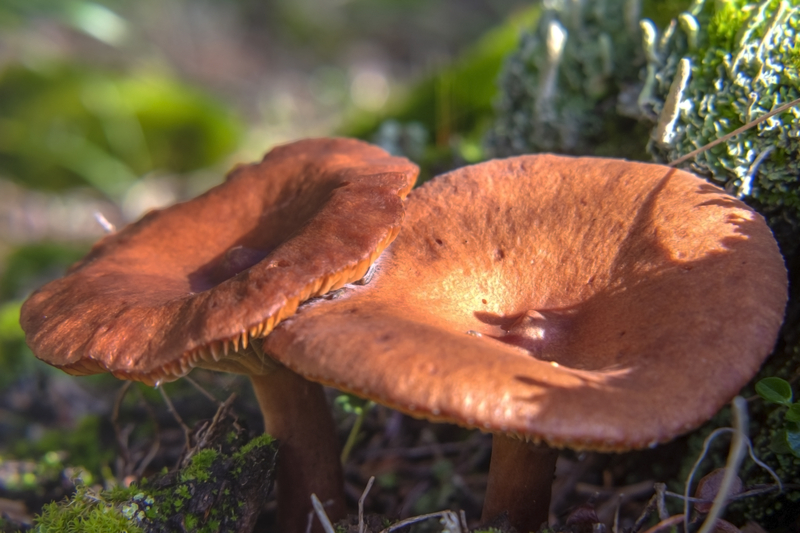Humans have been using mushrooms for medicinal purposes since before recorded history.
Ancient hieroglyphics suggest that the early Egyptians recognized the healing powers of mushrooms. Mesoamerican cultures used mushrooms not only in spiritual practice but for medicinal purposes as well. Early Chinese texts, dated around 100 BCE, describe various mushrooms as a treatment for many ailments. Even Ötzi the Iceman, a glacier mummy who lived around 3300 BCE, was discovered carrying birch polypore, a tree fungus used to fight infection.
However, it wasn’t until 1928, when Alexander Fleming discovered penicillin, derived from fungi, and used to treat bacterial infections, that modern medicine truly began to embrace the healing properties of mushrooms that our ancient ancestors have known about for millennia.
In the last decade, there have been more than 2000 studies focused on cancer-fighting medicinal mushrooms. Most of those studies have come out of Asia, which has long recognized a link between the use of medicinal mushrooms and longevity. The studies have found evidence that medicinal mushrooms can help to boost the immune systems of cancer patients and extend survival rates after a cancer diagnosis. Mushrooms are also shown to improve the quality of life for cancer patients by improving appetite, reducing fatigue, and even increasing the physical and mental well-being of patients.
These extensive studies of the cancer-fighting properties of medicinal mushrooms have even been able to determine which medicinal mushrooms work best for certain types of cancer. Based on this information, we have compiled a comprehensive list of the top cancer-fighting medicinal mushrooms.
 Reishi (Ganoderma lucidum, Lingzhi, mannentake):
Reishi (Ganoderma lucidum, Lingzhi, mannentake):
Used in the treatment of breast cancer, colon cancer, lung cancer, prostate cancer, sarcoma, liver cancer, and leukemia. This exotic mushroom, known in China as the “herb of spiritual potency,” and in Japan as the “10,000-year-old mushroom,” has also been called the “mushroom of immortality,” the “mushroom of spiritual potency,” and simply, the “spirit plant.” Eastern medicine has long held the belief that the Reishi mushroom promotes health and longevity by lowering cancer risk, lowering the risk of heart disease, and boosting the immune system.
Studies have shown that the Reishi mushroom can destroy cancer cells associated with breast cancer and prostate cancer. In colon cancer patients, Reishi boosted plasma antioxidant capacity, enhanced immune and tumor response, and suppressed the development of colorectal adenomas. Reishi improved the quality of life among patients with non–small cell lung cancer undergoing chemotherapy. It has also prevented tumors and prolonged the life of patients with monocytic leukemia and certain types of sarcomas. Reishi extract also inhibits hepatocellular carcinoma growth in liver cancer patients.
Although this cancer-fighting mushroom has historically grown on decaying hardwood trees in China and Europe, it also grows in parts of the western United States. Unlike most medicinal mushrooms, the Reishi is incredibly bitter.
Maitake (Hen-of-the-wood, Grifola frondose):
Used in the treatment of breast cancer and colon cancer. The Maitake mushroom has long been part of traditional Chinese and Japanese diets to treat diabetes and hypertension. This mushroom contains a complex sugar called beta-glucan, which helps to reduce cholesterol and improve artery function and overall cardiovascular, thus lowering the risk of heart disease.
Lab studies, as well as small uncontrolled studies involving humans, have shown that Maitake extracts slow the growth of tumors associated with breast and colon cancer.
The cancer-fighting Maitake mushroom is native to China, Europe, and North America, where it grows at the base of oak trees in late summer and early fall.
Turkey tail (Trametes versicolor, Coriolus versicolor, Polyporus versicolor):
Used in the treatment of breast cancer, colon cancer, and gastric cancer. Turkey tail mushrooms are rich in antioxidants. These antioxidants relieve stress and inflammation, as well as improve brain and cardio health.
Studies show that Turkey tail mushrooms stimulate immune function in patients with breast cancer and inhibit con cancer cell growth. Additionally, a review of eight studies that included more than 8,000 gastric cancer patients found that the use of Turkey tail, coupled with chemotherapy treatment, helped them live longer.
Turkey tail mushrooms are known as bracket fungi because they grow as thin circular structures. This common mushroom variety, which comes in different colors and grows on tree trunks and fallen trees in wooded areas throughout the world, is a medicinal mushroom offering a wide range of great health benefits.
Agaricus:
Used in the treatment of leukemia. Agaricus is a genus of mushrooms that encompasses both edible and poisonous varieties.
The Agaricus is the dominant cultivated mushroom in the Western world. Agaricus mushrooms are beneficial in treating type 2 diabetes, arteriosclerosis, liver disease, blood disorders, and digestive problems. The Agaricus mushroom can also lower cholesterol, prevent heart disease, inhibit the onset of osteoporosis, and stop stomach ulcers. Most importantly, certain Agaricus mushrooms are known for their strong cancer-fighting capabilities.
Research has found that the Agaricus blazei Murrill, an edible mushroom native to Brazil and cultivated in Japan, promotes anti-tumor activity against leukemia cells.
Cordyceps:
Used in the treatment of lymphoma, melanoma, and lung cancer. Cordyceps is a genus of parasitic fungi that includes nearly 600 different species that grow on insect larvae.
Traditional Chinese medicine used Cordyceps to treat fatigue, kidney disease, and low sex drive. Evidence suggests that Cordyceps can also minimize the impact of aging and reduce the risk of age-related cognitive decline, including the onset of Dementia & Alzheimer’s disease. Studies have also shown that Cordyceps fight tumors in melanoma, lymphoma, and lung cancer patients.
While these are considered the top cancer-fighting medicinal mushrooms, there are more than 100 types of mushrooms that have been safely used to treat cancer, particularly in Japan and China. Typically, these mushrooms have been used either alone or in combination with chemotherapy or radiotherapy to produce positive results.
Medicinal mushrooms are generally considered safe to include in one’s daily diet. However, there have been reports of side effects with certain medicinal mushrooms. These side effects may include skin irritation, liver damage, diarrhea, bloating, certain adverse drug interactions (particularly with drugs used to treat diabetes), and adverse reactions to certain foods and herbal supplements.
It is advised that cancer patients consult a physician before integrating medicinal mushrooms into their treatment regimen.





No Comments